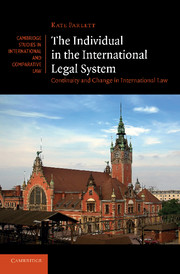Book contents
- Frontmatter
- Contents
- Foreword
- Acknowledgements
- Select list of abbreviations
- Table of cases
- Table of treaties
- Part I The Framework
- Part II The Individual in International Law
- 2 The individual and international claims
- 3 The individual in international humanitarian law
- 4 The individual in international criminal law
- 5 The individual in international human rights law
- Part III Reassessing the Framework
- Bibliography
- Index
- CAMBRIDGE STUDIES IN INTERNATIONAL AND COMPARATIVE LAW
- References
4 - The individual in international criminal law
Published online by Cambridge University Press: 19 May 2011
- Frontmatter
- Contents
- Foreword
- Acknowledgements
- Select list of abbreviations
- Table of cases
- Table of treaties
- Part I The Framework
- Part II The Individual in International Law
- 2 The individual and international claims
- 3 The individual in international humanitarian law
- 4 The individual in international criminal law
- 5 The individual in international human rights law
- Part III Reassessing the Framework
- Bibliography
- Index
- CAMBRIDGE STUDIES IN INTERNATIONAL AND COMPARATIVE LAW
- References
Summary
Introduction
It is now widely acknowledged that individual criminal responsibility is imposed on individuals through international criminal law. This is most often traced to the famous statement of the International Military Tribunal at Nuremberg in 1946 that:
crimes against international law are committed by men, not abstract entities, and only by punishing individuals who commit such crimes can the provisions of international law be enforced … individuals have duties which transcend the national obligations of obedience imposed by the individual state.
This chapter explores the development of individual criminal responsibility under international law. The first section of the chapter looks at often-cited ‘antecedents’ of individual responsibility for international crimes; the second section examines individual criminal responsibility in the inter-war period; and the third section traces the evolution of individual criminal responsibility since 1945.
The term ‘international criminal law’ is used in a broader sense by some scholars to include international crimes of states; crimes established by treaty regimes which require states to prohibit conduct in their domestic law; aspects of procedural law applicable in international tribunals; and transnational or inter-state cooperation in criminal matters, including through extradition law. Although these types of rules may have relevance for individuals, the primary inquiry of this chapter is the extent to which international law imposes obligations on individuals which result in individual criminal responsibility. The focus here is on the principle of individual criminal responsibility in international law, rather than on these other aspects of international crimes.
- Type
- Chapter
- Information
- The Individual in the International Legal SystemContinuity and Change in International Law, pp. 229 - 277Publisher: Cambridge University PressPrint publication year: 2011

